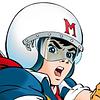Take a photo of a barcode or cover
adventurous
dark
funny
medium-paced
Plot or Character Driven:
N/A
Strong character development:
No
Loveable characters:
No
Diverse cast of characters:
Yes
Flaws of characters a main focus:
Complicated
adventurous
mysterious
slow-paced
Plot or Character Driven:
Plot
Strong character development:
N/A
Loveable characters:
N/A
Diverse cast of characters:
Yes
Flaws of characters a main focus:
N/A
funny
inspiring
lighthearted
reflective
relaxing
slow-paced
Plot or Character Driven:
N/A
Strong character development:
N/A
Loveable characters:
N/A
Diverse cast of characters:
N/A
Flaws of characters a main focus:
N/A
This is a strange one to put a star rating to. I give it four stars because the book feels very valuable in it's way. I'm happy to have it on my shelf. That being said, I believe I only really enjoyed one third of the stories, thought one third were meh, and disliked the final third. I often felt that what I liked and disliked could be sorted by region. I tended to prefer stories sourced from the landmass between Ireland, Russia, and Arabic nations. I thought I disliked stories from the USA and Africa. But it's not entirely true. My favourite story in the book, Furburger, is American and towards the end of the book I found African stories I enjoyed though I had not taken well to those in the earlier part of the book. I think the truth is most of the US "hillbilly" stories had little to no appeal for me because most felt pointless or perhaps I simply couldn't connect to them. As for African and Inuit stories, it was the repeated topic of incest that made me disinterested. (Certainly I don't think these are indicative of Inuit or African stories in general but rather a concentration of themes selected for this collection.) Perhaps it was also that I had less relationship to these stories. They felt like outliers to me. Less familiar themes than tales that have a similarity to the Mother Goose tales of my childhood which is most apparent in European and northern Asian countries. I started thinking perhaps the tales I enjoyed less would have improved in my esteem if they had been tied to a short paragraph giving me a bit of cultural or historical context.
Beyond my personal tastes, I see a lot of value in this collection. Particularly for someone who is just beginning to move beyond the confines of Grimm, Perrault, and Anderson. There's a bit of a taste of many regions and plenty of variety in this book. In addition, I found the stories I disliked to be very short and quickly pass before I was in more pleasant territory. (Though this could be my preference for longer stories determining what I took to in this book.)
This collection will take a prideful place on my shelves to be referred back to later; to read the best stories aloud at parties and for reference when I need a refresher on a particular tale. I was tempted to rate it three stars because I only really clicked with a third of the stories but the overall book feels so important and so lovely that I can't bring myself to begrudge it for the tales I couldn't get into. I imagine I'll be likely to reach for it in the future, just to revisit a few pages or a few stories and get that warm fuzzy feeling of sitting around a fire trading tales.
The illustrations are enchanting and Angela Carter is a remarkable story-teller. I would certainly recommend this book to anyone with an interest in fairy tales and folklore.
Beyond my personal tastes, I see a lot of value in this collection. Particularly for someone who is just beginning to move beyond the confines of Grimm, Perrault, and Anderson. There's a bit of a taste of many regions and plenty of variety in this book. In addition, I found the stories I disliked to be very short and quickly pass before I was in more pleasant territory. (Though this could be my preference for longer stories determining what I took to in this book.)
This collection will take a prideful place on my shelves to be referred back to later; to read the best stories aloud at parties and for reference when I need a refresher on a particular tale. I was tempted to rate it three stars because I only really clicked with a third of the stories but the overall book feels so important and so lovely that I can't bring myself to begrudge it for the tales I couldn't get into. I imagine I'll be likely to reach for it in the future, just to revisit a few pages or a few stories and get that warm fuzzy feeling of sitting around a fire trading tales.
The illustrations are enchanting and Angela Carter is a remarkable story-teller. I would certainly recommend this book to anyone with an interest in fairy tales and folklore.
adventurous
dark
funny
medium-paced
Plot or Character Driven:
A mix
Strong character development:
Complicated
Loveable characters:
Complicated
Diverse cast of characters:
Yes
Flaws of characters a main focus:
Complicated
Angela Carter's Book of Fairy Tales includes many stories that I wouldn't necessarily consider fairy tales, some being more folk tales or legends. I enjoyed and appreciated how diverse and multicultural the collection was - it was interesting to note themes in the stories of certain cultures. These ranged from Inuit to Sudanese Dinka, Hungarian to American Hillbilly, Egyptian to English Gypsy, and from Chinese to Mexican, amongst many others.
Being accustomed to reading mostly novels, I found it harder to get into the chop-and-change nature of an anthology of very different short stories. This is a book I've dipped in and out of over a longer period of time rather than reading all in one go, because the shorter format made it harder to get invested in the characters or their stories. That said, this is a valuable collection of fairy tales, including some that wouldn't be advised for children.
I would have appreciated more commentary interpreting meanings from the tales as the oral storytelling genre frequently defies logic - however, that appears not to be the purpose of this book. I feel like many traditional tales are a form of wisdom literature for their cultures and would require more meditation and re-reading for me to make sense of them. On the other hand, perhaps fantastical nonsense is all they're meant to be. But when Angela Carter described fairy tales as being 'a story where one king goes to another king to ask for a cup of sugar', I can't help feeling there is more to the stories than that which is spoken. The common theme linking all these fairy tales is the experiences of women.
Being accustomed to reading mostly novels, I found it harder to get into the chop-and-change nature of an anthology of very different short stories. This is a book I've dipped in and out of over a longer period of time rather than reading all in one go, because the shorter format made it harder to get invested in the characters or their stories. That said, this is a valuable collection of fairy tales, including some that wouldn't be advised for children.
I would have appreciated more commentary interpreting meanings from the tales as the oral storytelling genre frequently defies logic - however, that appears not to be the purpose of this book. I feel like many traditional tales are a form of wisdom literature for their cultures and would require more meditation and re-reading for me to make sense of them. On the other hand, perhaps fantastical nonsense is all they're meant to be. But when Angela Carter described fairy tales as being 'a story where one king goes to another king to ask for a cup of sugar', I can't help feeling there is more to the stories than that which is spoken. The common theme linking all these fairy tales is the experiences of women.
adventurous
dark
mysterious
fast-paced
Eventually just gave up on this. The stories were too short, which made the whole book not flow very well. Also they were not particularly nice stories at all
These stories were collected and curated by Carter, not written or even edited by her. So while they share her taste in the weird and feminist, they do not exhibit her writing skill – more noticeably so in some cases than others.
Carter spent many years collecting these stories for what was originally two separate books published by Virago. She sought translations into English, ideally transcriptions from oral storytellers, from all over the world and the result is truly the most international collection I have ever read. For example, the final chapter’s stories are labelled as: Yiddish; Norwegian; Africa: Bondes; USA; Africa: Hausa; Chinese; Surinamese.
The tales are sorted into chapters labelled things like “Good girls and where it gets them” and “Strong minds and low cunning”. The main characters are invariably female and it is almost always a woman who gets the upper hand. There are several variants of familiar tales such as Cinderella or Sleeping Beauty, but most of the stories were new to me. I got the feeling there was a wide span covered from traditional centuries-old folk tales to random off-the-cuff jokes.
These stories are not on the whole any weirder than the fairy tales I grew up with (mostly Grimm and Andersen tales and not the Disneyfied versions), though some of them are. What I actually found more noticeable was how universal some themes are.
See my full review: http://www.noseinabook.co.uk/2016/07/17/the-past-was-hard-cruel-and-especially-inimical-to-women/
Carter spent many years collecting these stories for what was originally two separate books published by Virago. She sought translations into English, ideally transcriptions from oral storytellers, from all over the world and the result is truly the most international collection I have ever read. For example, the final chapter’s stories are labelled as: Yiddish; Norwegian; Africa: Bondes; USA; Africa: Hausa; Chinese; Surinamese.
The tales are sorted into chapters labelled things like “Good girls and where it gets them” and “Strong minds and low cunning”. The main characters are invariably female and it is almost always a woman who gets the upper hand. There are several variants of familiar tales such as Cinderella or Sleeping Beauty, but most of the stories were new to me. I got the feeling there was a wide span covered from traditional centuries-old folk tales to random off-the-cuff jokes.
These stories are not on the whole any weirder than the fairy tales I grew up with (mostly Grimm and Andersen tales and not the Disneyfied versions), though some of them are. What I actually found more noticeable was how universal some themes are.
See my full review: http://www.noseinabook.co.uk/2016/07/17/the-past-was-hard-cruel-and-especially-inimical-to-women/
I decided it would be best to read this book in bits rather than in one sitting.
Wonderful stories! This is such an enjoyable read, with very intelligent commentary.






